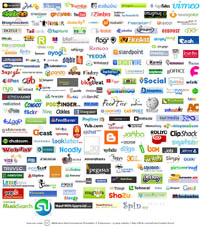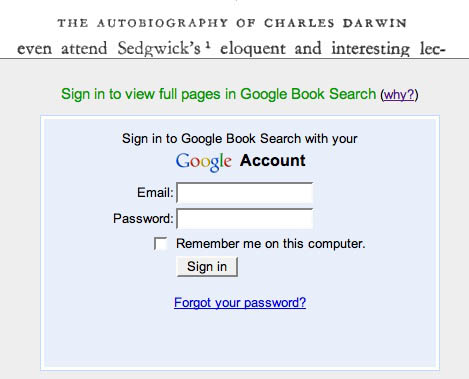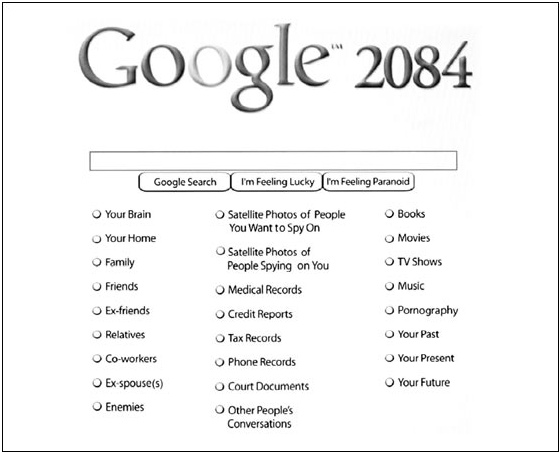A federal judge said Tuesday he intends to require Google Inc. to turn over some information to the Department of Justice . . .
progressive people are likely to defend Google against the encroachment of the govt. however, while i am in complete agreement with the sentiment that Google shouldn’t be giving information to the government about what people search for, i think the debate needs to be shifted in a dramatically different direction. the really important question (for the long term health of society) isn’t “should Google have to surrender information to this or any other government” but “why should Google have such sensitive information in the first place?”
if Google’s goal were simply as they say “to organize the world’s information and make it universally accessible and useful” then there really wouldn’t be a rationale for collecting information on what individuals search for. in reality of course, Google’s “reason for being” is to deliver people to advertisers and thus the need to collect all that data about us.
try this for a thought experiment. if Google continues to collect “all the world’s information” how long will it be before Google is indistinguishable from “God.” do we really want to give this much power to a private corporation whose first allegiance is to shareholders rather than the body politic?
what i can’t figure out is: why isn’t there a movement to develop a nonprofit, open source search engine? we have mozilla, we have wikipedia, we have linux. where is the people’s search engine? isn’t it time?
Category Archives: privacy
google buys writely, or, the book is reading you, part 2
Last week Google bought Upstartle, a small company that created an online word processing program called Writely.  Writely is like a stripped-down Microsoft Word, with the crucial difference that it exists entirely online, allowing you to write, edit, publish and store documents (individually or in collaboration with others) on the network without being tied to any particular machine or copy of a program. This evidently confirms the much speculated-about Google office suite with Writely and Gmail as cornerstone, and presumably has Bill Gates shitting bricks .
Writely is like a stripped-down Microsoft Word, with the crucial difference that it exists entirely online, allowing you to write, edit, publish and store documents (individually or in collaboration with others) on the network without being tied to any particular machine or copy of a program. This evidently confirms the much speculated-about Google office suite with Writely and Gmail as cornerstone, and presumably has Bill Gates shitting bricks .
Back in January, I noted that Google requires you to be logged in with a Google ID to access full page views of copyrighted works in its Book Search service. Which gave me the eerie feeling that the books are reading us: capturing our clickstreams, keywords, zip codes even — and, of course, all the pages we’ve traversed. This isn’t necessarily a new thing. Amazon has been doing it for a while and has built a sophisticated personalized recommendation system out of it — a serendipity engine that makes up for some of the lost pleasures of browsing a physical store. There it seems fairly harmless, useful actually, though it depends on who you ask (my mother says it gives her the willies). Gmail is what has me spooked. The constant sprinkle of contextual ads in the margin attaching like barnacles to my bot-scoured correspondences. Google’s acquisition of Writely suggests that things will only get spookier.
I’ve been a webmail user for the past several years, and more recently a blogger (which is a sort of online word processing) but I’m uneasy about what the Writely-Google union portends — about moving the bulk of my creative output into a surveilled space where the actual content of what I’m working on becomes an asset of the private company that supplies the tools.
Imagine you’re writing your opus and ads, drawn from words and themes in your work, are popping up in the periphery. Or the program senses line breaks resembling verse, and you get solicited for publication — before you’ve even finished writing — in one of those suckers’ poetry anthologies.  Leave the cursor blinking too long on a blank page and it starts advertising cures for writers’ block. Copy from a copyrighted source and Writely orders you to cease and desist after matching your text in a unique character string database. Write an essay about terrorists and child pornographers and you find yourself flagged.
Leave the cursor blinking too long on a blank page and it starts advertising cures for writers’ block. Copy from a copyrighted source and Writely orders you to cease and desist after matching your text in a unique character string database. Write an essay about terrorists and child pornographers and you find yourself flagged.
Reading and writing migrated to the computer, and now the computer — all except the basic hardware — is migrating to the network. We here at the institute talk about this as the dawn of the networked book, and we have open source software in development that will enable the writing of this new sort of born-digital book (online word processing being just part of it). But in many cases, the networked book will live in an increasingly commercial context, tattooed and watermarked (like our clothing) with a dozen bubbly logos and scoured by a million mechanical eyes.
Suddenly, that smarmy little paper clip character always popping up in Microsoft Word doesn’t seem quite so bad. Annoying as he is, at least he has an off switch. And at least he’s not taking your words and throwing them back at you as advertisements — re-writing you, as it were. Forgive me if I sound a bit paranoid — I’m just trying to underscore the privacy issues. Like a frog in a pot of slowly heating water, we don’t really notice until it’s too late that things are rising to a boil. Then again, being highly adaptive creatures, we’ll more likely get accustomed to this softer standard of privacy and learn to withstand the heat — or simply not be bothered at all.
google: i’ll be your mirror
From notes accidentally published on Google’s website, leaked into the blogosphere (though here from the BBC): plans for the GDrive, a mirror of users’ hard drives.
With infinite storage, we can house all user files, including e-mails, web history, pictures, bookmarks, etc; and make it accessible from anywhere (any device, any platform, etc).
I just got a shiver — a keyhole glimpse of where this is headed. Google’s stock made a shocking dip last week after its Chief Financial Officer warned investors that growth of its search and advertising business would eventually slow down. The sudden panicked thought: how will Google realize its manifest destiny? You know: “organizing the world’s information and making it universally accessible (China notwithstanding) and useful”? How will it continue to feed itself?
Simple: storage.
Google, as it has already begun to do (Gmail, get off my back!), wants to organize our information and make it universally accessible and useful to us. No more worries about backing up data — Google’s got your back. No worries about saving correspondences — Google’s got those. They’ve got your shoebox of photographs, your file cabinet of old college papers, your bank records, your tax returns. All nicely organized and made incredibly useful.
But as we prepare for the upload of our lives, we might pause to ask: exactly how useful do we want to become?
cheney and google
(this is a follow-up to ben’s recent post “the book is reading you.”
i rarely read Maureen Dowd but the headline of her column in today’s New York Times, “Googling past the Graveyard,” caught my attention. Dowd calls Dick Cheney on the carpet for asking Google to release the search records of U.S. citizens. while i’m horrified that the govt. would even consider asking for such information, i’m concerned that the way this particular issue is playing out, Google is being portrayed as the poor beleaguered neutral entity caught between an over-reaching bureaucracy and its citizens. Cheney will expire eventually. in the meantime Google will collect even more data. Google is a very big corporation, who’s power will grow over time. in the long run, why aren’t people outraged that this information is in Google’s hands in the first place. shouldn’t we be?
the book is reading you
I just noticed that Google Book Search requires users to be logged in on a Google account to view pages of copyrighted works.

They provide the following explanation:
Why do I have to log in to see certain pages?
Because many of the books in Google Book Search are still under copyright, we limit the amount of a book that a user can see. In order to enforce these limits, we make some pages available only after you log in to an existing Google Account (such as a Gmail account) or create a new one. The aim of Google Book Search is to help you discover books, not read them cover to cover, so you may not be able to see every page you’re interested in.
So they’re tracking how much we’ve looked at and capping our number of page views. Presumably a bone tossed to publishers, who I’m sure will continue suing Google all the same (more on this here). There’s also the possibility that publishers have requested information on who’s looking at their books — geographical breakdowns and stats on click-throughs to retailers and libraries. I doubt, though, that Google would share this sort of user data. Substantial privacy issues aside, that’s valuable information they want to keep for themselves.
That’s because “the aim of Google Book Search” is also to discover who you are. It’s capturing your clickstreams, analyzing what you’ve searched and the terms you’ve used to get there. The book is reading you. Substantial privacy issues aside, (it seems more and more that’s where we’ll be leaving them) Google will use this data to refine Google’s search algorithms and, who knows, might even develop some sort of personalized recommendation system similar to Amazon’s — you know, where the computer lists other titles that might interest you based on what you’ve read, bought or browsed in the past (a system that works only if you are logged in). It’s possible Google is thinking of Book Search as the cornerstone of a larger venture that could compete with Amazon.
There are many ways Google could eventually capitalize on its books database — that is, beyond the contextual advertising that is currently its main source of revenue. It might turn the scanned texts into readable editions, hammer out licensing agreements with publishers, and become the world’s biggest ebook store. It could start a print-on-demand service — a Xerox machine on steroids (and the return of Google Print?). It could work out deals with publishers to sell access to complete online editions — a searchable text to go along with the physical book — as Amazon announced it will do with its Upgrade service. Or it could start selling sections of books — individual pages, chapters etc. — as Amazon has also planned to do with its Pages program.
Amazon has long served as a valuable research tool for books in print, so much so that some university library systems are now emulating it. Recent additions to the Search Inside the Book program such as concordances, interlinked citations, and statistically improbable phrases (where distinctive terms in the book act as machine-generated tags) are especially fun to play with. Although first and foremost a retailer, Amazon feels more and more like a search system every day (and its A9 engine, though seemingly always on the back burner, is also developing some interesting features). On the flip side Google, though a search system, could start feeling more like a retailer. In either case, you’ll have to log in first.
itp winter 2005 show
New York University’s Interactive Telecommunications Program recently had its Winter 2005 show. As always, the show was packed with numerous projects and visitors. Some of the work touched upon ideas we think about at the institute.


A few projects explored new ways to mediate New York. Leif Mangelsen and Jung Oh, in Time Scanned, created static panoramic images by stitching together slivers of digital video to document New York over time and space. Moving beyond the traditional guide book and map, the augmented reality project, DataCity looked at how we navigate New York. In this case, Shagun Singh, Jon Kirchherr and Saranont Limpananont proposed to layer contextual information on an interactive display system to enhance the experience of traveling through the city.
 Saiyanthan Sriskandarajah created, The Wasteland, a digital representation of T.S. Eliot’s poem. Each letter is encoded into a binary format and then printed with a large format printer. The end result is an abstracted digital representation of a literary work.
Saiyanthan Sriskandarajah created, The Wasteland, a digital representation of T.S. Eliot’s poem. Each letter is encoded into a binary format and then printed with a large format printer. The end result is an abstracted digital representation of a literary work.
Joshua Knowles, Adam Asarnow, Charles Pratt, and Rocio Barcia created Itp.licio.us which was a new twist to the facebook, and explored folksonomy, privacy, and social networks by asking fellow first year students to tag each other. The successful end result (students received an average of 29.4 tags) also addressed issues of internet mediated social interaction and making public the personal information of what classmates think of others.
Although, the twice a year itp shows can be a bit of an overwhelming experience, they offer a glimpse (albeit scaled down) of emerging applications of technology which are often just around the corner for mainstream use.
sober thoughts on google: privatization and privacy

Siva Vaidhyanathan has written an excellent essay for the Chronicle of Higher Education on the “risky gamble” of Google’s book-scanning project — some of the most measured, carefully considered comments I’ve yet seen on the issue. His concerns are not so much for the authors and publishers that have filed suit (on the contrary, he believes they are likely to benefit from Google’s service), but for the general public and the future of libraries. Outsourcing to a private company the vital task of digitizing collections may prove to have been a grave mistake on the part of Google’s partner libraries. Siva:
The long-term risk of privatization is simple: Companies change and fail. Libraries and universities last…..Libraries should not be relinquishing their core duties to private corporations for the sake of expediency. Whichever side wins in court, we as a culture have lost sight of the ways that human beings, archives, indexes, and institutions interact to generate, preserve, revise, and distribute knowledge. We have become obsessed with seeing everything in the universe as “information” to be linked and ranked. We have focused on quantity and convenience at the expense of the richness and serendipity of the full library experience. We are making a tremendous mistake.
This essay contains in abundance what has largely been missing from the Google books debate: intellectual courage. Vaidhyanathan, an intellectual property scholar and “avowed open-source, open-access advocate,” easily could have gone the predictable route of scolding the copyright conservatives and spreading the Google gospel. But he manages to see the big picture beyond the intellectual property concerns. This is not just about economics, it’s about knowledge and the public interest.
What irks me about the usual debate is that it forces you into a position of either resisting Google or being its apologist. But this fails to get at the real bind we all are in: the fact that Google provides invaluable services and yet is amassing too much power; that a private company is creating a monopoly on public information services. Sooner or later, there is bound to be a conflict of interest. That is where we, the Google-addicted public, are caught. It’s more complicated than hip versus square, or good versus evil.
Here’s another good piece on Google. On Monday, The New York Times ran an editorial by Adam Cohen that nicely lays out the privacy concerns:
Google says it needs the data it keeps to improve its technology, but it is doubtful it needs so much personally identifiable information. Of course, this sort of data is enormously valuable for marketing. The whole idea of “Don’t be evil,” though, is resisting lucrative business opportunities when they are wrong. Google should develop an overarching privacy theory that is as bold as its mission to make the world’s information accessible – one that can become a model for the online world. Google is not necessarily worse than other Internet companies when it comes to privacy. But it should be doing better.
Two graduate students in Stanford in the mid-90s recognized that search engines would the most important tools for dealing with the incredible flood of information that was then beginning to swell, so they started indexing web pages and working on algorithms. But as the company has grown, Google’s admirable-sounding mission statement — “to organize the world’s information and make it universally accessible and useful” — has become its manifest destiny, and “information” can now encompass the most private of territories.
At one point it simply meant search results — the answers to our questions. But now it’s the questions as well. Google is keeping a meticulous record of our clickstreams, piecing together an enormous database of queries, refining its search algorithms and, some say, even building a massive artificial brain (more on that later). What else might they do with all this personal information? To date, all of Google’s services are free, but there may be a hidden cost.
“Don’t be evil” may be the company motto, but with its IPO earlier this year, Google adopted a new ideology: they are now a public corporation. If web advertising (their sole source of revenue) levels off, then investors currently high on $400+ shares will start clamoring for Google to maintain profits. “Don’t be evil to us!” they will cry. And what will Google do then?
images: New York Public Library reading room by Kalloosh via Flickr; archive of the original Google page
google dystopia
Google as big brother: “Op-Art” by Randy Siegel from today’s NY Times.

google and big brother
Can Google remain true to its promise to “do no evil,” now that it has shareholders to worry about, advertisers to please, and an ever-increasing reach into the repositories of human knowledge? Google still gives you that warm and fuzzy feeling. It’s got the goofy name, those cute seasonal tailorings of its masthead, the lava lamps. And this is not to mention the various amusing pastimes – the “Google Whack” game in which you try to find two words that cohabit only one of the search engine’s eight billion web pages; or every writer’s guilty pleasure, the Googling of the self, the “auto-Google,” that delicious act of cyber-onanism.
But where might it lead? One day, when I open my fridge, might a sensor not read my searching eye and know that I am looking for milk? And knowing that I have run out, suggest an array of retailers who might be able to replenish my supply? Could Google come to mediate every exchange of information, no matter how inane, or how carnal?
Or could it come to resemble something like the Central Intelligence Corporation in Neal Stephenson’s Snow Crash – a cross between the CIA, the Library of Congress, and DARPA’s “Total Information Awareness” program?
MercuryNews.com | 12/14/2004 | Does Google move augur commercialization of libraries?
